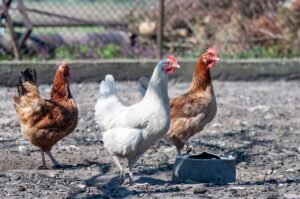
Living in an urban area doesn’t mean you have to give up on your dream of raising chickens. However, there are certain key considerations that you need to keep in mind to ensure a successful and compliant chicken-keeping experience. From understanding local regulations to providing adequate space and shelter, this article will guide you through the essential factors to consider when raising chickens in urban areas. So, if you’ve ever wondered about the ins and outs of urban chicken farming, read on to discover everything you need to know.
Zoning Regulations
When considering raising chickens in an urban area, it is crucial to research and understand the local zoning laws and regulations surrounding this activity. Every city or municipality may have specific restrictions or guidelines to ensure that backyard chicken keeping is done in a safe and responsible manner.
Take the time to familiarize yourself with the specific restrictions on chicken keeping in your area. Some cities may have limits on the number of chickens you can have, while others may require permits or licenses. It is important to adhere to these regulations to avoid any potential legal issues or fines.
Space Requirements
Determine the minimum space needed per chicken before embarking on your urban chicken keeping journey. Chickens require enough room to move around comfortably and engage in natural behaviors like scratching and dust bathing. The recommended space per bird differs depending on their size and breed, so be sure to do your research.
Consider the available space in your urban area. While urban environments may not offer large open areas for chicken keeping, there are ways to maximize the space you have. Utilizing vertical space by building up rather than out can significantly increase the chicken coop area.
Noise and Odor Control
One of the primary concerns when raising chickens in urban areas is the potential for noise disturbances and odor issues. While most chickens are not excessively noisy, loud crowing can be an issue if you choose to keep roosters. Before deciding to keep roosters, it’s essential to check local regulations as many cities prohibit them due to noise concerns.
To minimize the odor from chicken waste, implement strategies such as proper waste management, regular cleaning, and well-maintained ventilation systems. Ensuring a clean coop and promptly removing soiled bedding can help control smells. Composting the waste can also be an environmentally friendly option.
Predator Protection
Even in urban areas, there may be potential predators that pose a threat to your chickens. Predators such as raccoons, opossums, and even neighborhood dogs can target your flock. It is crucial to identify potential predators in your environment and take steps to protect your chickens from them.
Building or modifying your chicken coop to make it predator-proof is essential. Securely closing off any potential entry points, such as windows or gaps, will help keep predators out. Additionally, implementing additional security measures, such as motion-sensor lights or an electric fence, can provide extra nighttime protection.
Neighbor Relations
Maintaining positive relationships with your neighbors is vital when raising chickens in an urban area. Before starting your chicken-keeping venture, communicate with your neighbors about your plans and address any concerns or objections they may have. Being transparent and providing information can go a long way in alleviating any potential conflicts.
Ensure that your chickens do not cause any disturbances or safety issues for your neighbors. For example, it is important to keep your chickens enclosed and prevent them from trespassing onto your neighbors’ properties. Regularly clean and maintain the coop to minimize smells and potential nuisances.
Breed Selection
Choosing the right chicken breeds for an urban setting is crucial to ensure a harmonious living environment. Factors such as noise levels, egg production, and temperament should be considered when selecting breeds.
Look for breeds that are known to be resilient and adaptable to varying climates and living conditions. Some popular choices for urban areas include Rhode Island Reds, Australorps, or Silkies. Research each breed’s characteristics and choose the ones that best suit your specific needs and preferences.
Feeding and Nutrition
Understanding the dietary needs of chickens is essential for their overall health and egg production. While chickens are natural foragers, the availability of natural food sources may be limited in an urban environment. It is essential to provide a balanced diet that meets their nutritional requirements.
Consider the options for food sources in your urban area. Along with commercial chicken feed, you can supplement their diet with kitchen scraps or grow your own chicken-friendly plants. Remember to provide clean, fresh water at all times to ensure optimal hydration.
Healthcare and Veterinary Support
Just like any other pets, chickens require regular healthcare and veterinary support. Find a local veterinarian experienced in chicken care who can provide guidance and medical assistance when needed. Regular health checks and vaccinations can prevent and detect potential health issues early.
Educate yourself about common chicken health issues and treatments to promote proactive care. Recognizing signs of illness, such as changes in behavior or appearance, is crucial. By being vigilant and taking appropriate measures, you can maintain the health and well-being of your flock.
Waste Management
One of the responsibilities of raising chickens is implementing a waste management plan for chicken waste. Proper waste management helps minimize odor and prevent environmental contamination.
Consider composting the chicken waste as a sustainable waste management option. Composting not only reduces odor but also produces nutrient-rich compost that can be used in your garden. Additionally, explore recycling methods for waste, such as using soiled bedding for mulch or seeking local programs that accept chicken waste.
Egg Collection and Storage
Establish a routine for collecting eggs to ensure their freshness and quality. Daily collection is ideal to prevent eggs from accumulating and becoming dirty or cracked. Regularly clean the nesting boxes to provide a clean environment for egg-laying.
When collecting eggs, handle them carefully to avoid damaging their delicate shells. If necessary, gently clean soiled eggs with a damp cloth. Properly storing eggs can help maintain their freshness. Keep them in a cool place or refrigerate them if desired.
Consider additional storage options for surplus eggs. If you have more eggs than you can consume, you may choose to donate or sell them to neighbors, friends, or local markets. Always check and comply with any regulations regarding the sale of eggs in your area.
By considering these key aspects when raising chickens in urban areas, you can create a harmonious and responsible environment for both your chickens and your neighbors. With proper planning, understanding, and care, urban chicken keeping can be a rewarding and sustainable pursuit.







